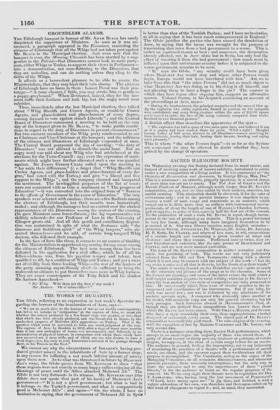SACRED HARMONIC SOCIETY.
ON Wednesday evening this Society deviated from its usual course, and. instead of reviving some work of' known celebrity, introduced to public notice a new composition of a living author. It was announced as " the Oratorio of Resurrection and Ascension, by George Elvey, Mus. Doe." This is a misnomer : an oratorio, properly speaking, is a sacred drama of more than one act set to music. The Tod „Tem of GRAUN and the Davide Penitente of MozArtr, although much longer than Dr. Ei.vEY's composition, are not, 1101` are they called by their authors, oratorios, but sacred cantatas. This distinction should be observed, if for the sake of correctness only : and in the present instance it was impolitic to an- nounce a work of such range and magnitude as an oratorio, which turned Out to be little more than an anthem with instrumental accom- paniments, of about the length of one of HANDEL'S Ghandos Anthems, and occupying, in point of fact, scarcely half the first act of the concert. To the production of such a work Dr. ELVEY is equal, though incom- petent to the task of producisg an oratorio. This is a power intrusted to very few hands, although many have imagined themselves to be possessed of it. Our own library contains many English oratorios— oratorios by SMSTIT, ArrERBERY, Dr. Woncssx, Dr. ARNE, Dr. ARNOLD, M. P. KING, Dr. CLARKE, and others of less note, to wit, compositions of' a certain length and containing a given number of songs and choruses: and there they remain. Performed once or twice, they are now fbrgotten and unknown, like the epic poems of BLACKMORE and Corrus, and are now mere musical curiosities.
The form of Dr. ELVEY'S e0n1p0Siti011 is neither narrative nor dra- matic, but partaking of both. The words are not very judiciously selected from the Old and New Testaments ; ending with a chorus which it is not easy to connect with the subject of the is ork—" Let the sea make a noise and all that is therein, let the floods chip their hands!"
The music is mostly framed. on the Handelian model—quite as much in the structure and phrases of' the songs as in the choruses. Some of the former are pleasing ; and smne of the latter evince the skill which a well-taught musician acquires in vocal writing, when (as in Dr. avnv's case) the best models of this style of' composition are daily presented to him. He occasionally failed, from want of similar practice in the ar- rangement and combination of his instruments, l3itt it' not lofty, his work was never low ; nor was it deformed by any admixture of the modern operatic style. A composer who avowedly takes another as his model, will assuredly copy not only his general character, but his very passages. Such instances abound in MeNinmssouN's Pant, al- though they are derived from compositions less known than those which Dr. Ei.vr:v has interpolated. With GRAEN, HAYDN, and SPURR. Who hare a Style essentially their own, these appropriations, it desl,:;:ied or ..cci.h.adal, rarely occur. The choral part of Dr. EiNEV'S et on poSition Was creditably performed. The solo-singing attn.: evening, with the exception of that by Madame CARADoat and. Mr. YOUNG, was very second-rate.
There is a nuisance attending these Exeter Trail performances, which annoys in no small degree the majority of those who attend them. A party of about twenty or thirty persons, retainers or partisans of certain
singers, we suppose, at the close of' certain songs bellow Ibr an encore. The audience in general, feelit.g the impropriety, not to say indecency of associating the practices of a theatre with a performance of sacred
music, are silent, and the encorers repeat their voeiferations till then' purpose is accomplished. The Conductor, acting as the organ of time Managing Committee, on all occasions discountenances, and whenever possible prevents, these unseemly interruptions; but the only way to abate the Inds:wee and to stop the impertinence of these " partial friends," is for the audience to insist on the regular progress of the
concert. On Wednvsday night their throats were in requisition for Mrs. F. LABIACHE; who, having sung the last movement of PmwoLEses " 0 Lord, have mercy upon me !" in jig time, and finished it with a vulgar addendum of her own, was therelbre and thereupon called on by this knot of clacqueurs to repeat it ; and, as usual, they succeeded.


























 Previous page
Previous page